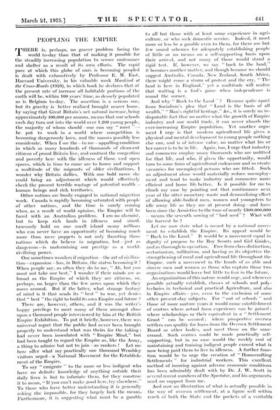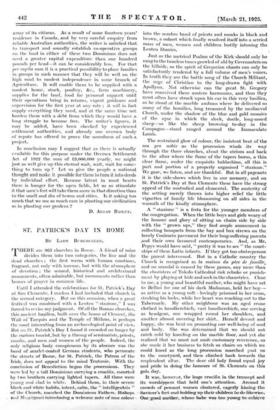PEOPLING THE EMPIRE
THERE is, perhaps, no graver problem facing the world to-day than that of making it possible for the steadily increasing population to secure sustenance and shelter as a result of its own efforts. The rapid pace at which this globe of ours is becoming peopled is dealt with exhaustively by Professor E. M. East, Harvard University, in his valuable work Mankind at the Cross-Roads (1923), in which book he declares that at the present rate of increase all habitable portions of the earth will be, within 100 years' time, as densely populated as is Belgium to-day. The assertion is a serious one, but its gravity is better realized brought nearer home, by saying that Great Britain's net natural increase, being approximately 400,000 per annum, means that our schools each day turn out into the world over 1,200 young people, the majority of whom should—one can say " must "- be put to work in a world where competition is becoming dangerously keen, and the masses possibly less considerate. When I see the—to me—appalling condition in which so many hundreds of thousands of clean-cut citizens of proud Britain live, and contrast the congestion and poverty here with the idleness of those vast open spaces, which in time to conic are to house and support a multitude of the migrants of older civilizations, I wonder why Britain dallies. With one bold move she could bring an adjustment which would effectively check the present terrible wastage of potential wealth -- human beings and rich territories.
Other nations arc busily engaged in national migration work. Canada is rapidly becoming saturated with people of other nations, and the time is surely coming when, as a result of world opinion, the Empire will be faced with an Australian problem. I am no alarmist, but to keep rich lands in idleness and simul- taneously hold on one small island many millions who can never have an opportunity of becoming much more than mere puppets is not only flaunting those nations which do believe in migration, but—just as dangerous—is undermining our prestige as a world- civilizing power.
One sometimes wonders if migration—the art of civiliza- tion—expansion—has, in Britain, the status becoming it ! When people say, as often they do to me, " Ah, but you must not take our best," I wonder if their minds arc as broad as the Empire of which they arc citizens, or, perhaps, no larger than the few acres upon which they move around. But if the latter, what strange fantasy of mind is it that sends its " best " to war, yet denies that " best " the right to build its own Empire and future There are, however, others, and it was the writer's happy privilege to meet many of them amongst close upon a thousand people interviewed by him at the British Empire Exhibition. • To put it briefly, however, there was universal regret that the public had never been brought properly to understand what was theirs for the taking ; had never . been inoculated with " Empire Mind," but had been taught to regard the Empire as, like the Army, a thing to admire but not to join—as rankers ! Let me here offer what my practically one thousand Wembley visitors urged--a National Movement for the Establish- ment of the Empire.
To say " emigrate " to the more or less indigent who have no definite knowledge of anything outside their daily lives is but to infuriate them, for they construe it to mean," If you can't make good here, try elsewhere." To those who have better understanding it is generally asking the impossible, for they largely lack the means. Furthermore, it is suggesting what must be a gamble to all but those with at least some experience in agri- Culture, or who seek domestic service. Indeed, it must more or less be a gamble even to them, for there are but few sound schemes for adequately establishing people of little or no means on a self-supporting basis upon their arrival, and not many of those would stand a rigid test. If, however, we say " back to the land," it becomes another matter, and though because we should suggest Australia, Canada, New Zealand, South Africa, there might come a storm of protest and the cry, " The land is here in England," yet a multitude will realize that waiting is a fool's game when independence is round the corner.
And why " Back to the Land " ? Because quite apart from Socialism's plea that " Land is the basis of all wealth," "Man's rightful heritage," &e., it is surely an in- disputable fact that no matter what the growth of Empire industry and our world trade, it can never absorb the ever-increasing Empire population. Yet another argu- ment I urge is that modern agricultural life gives a physical and mental development to young people nothing else can, and is of intense value, no matter what his or her career is to be in life. Again, too, I urge that industry and commerce employ many thousands who arc unfitted for that life, and who, if given the opportunity, would turn to some form of agricultural endeavour and so create vacancies for unemployed persons who are fitted. Such an adjustment alone would materially reduce unemploy- ment and tend to make industry and commerce more efficient and home life better. Is it possible for me to clinch my case by pointing out that continuance next year of the utter monetary waste and demoralizing effect of allowing able-bodied men, women and youngsters to idle away life as they arc at present doing —and have been since the Armistice to the tune of nearly £300,000,000 ---means the seventh sowing of "bad seed " ? What will the harvest be ?
Let me now state what is meant by a national move- ment to establish the Empire. Its appeal would be " Back to the Land." It would be a movement equal in dignity of purpose to the Boy Scouts and Girl Guides, and as thorough in operation. Free from class distinction, sectarianism, militarism, and having as its objective the strengthening of rural and agricultural life throughout the Empire, such a movement in the hands of as able and sincere men and women as those who captain those two organizations would leave but little to fear in the future.
An organization of this nature would urge, and wherever possible actually establish, classes at schools and poly- technics in technical and practical Agriculture, and also in Empire affairs— -yes, even to the exclusion of some other present-day subjects. For " out of schools " and those of more mature years it would cause establishment of centres where actual farm experience can be gained ; where scholarships or their equivalent in a " Settlement Grant " can be secured ; where prospective oversea settlers can qualify for loans from the Oversca Settlement Board or other bodies, and meet those on the same errand. Such centres could be made practically self- supporting, but in no case would the weekly cost of maintaining and training indigent people exceed what is now being paid them to live in idleness. A further func- tion would he to urge the creation of " Homecrofting Settlements " for industrial workers. This excellent method of insuring against adverse economic conditions has been admirably dealt with by Dr. J. W. Scott in several recent numbers of the Spectator, and his arguments need no support from me.
And now an illustration of what is actually possible in the way of oversca settlement, at a figure well within reach of both the State and the pockets of a veritable army of its citizens. As a result of some fourteen years' residence in Canada, and by very careful enquiry from reliable Australian authorities, the writer is satisfied that to transport and soundly establish co-operative groups on the land in either of these two Dominions does not need a greater capital expenditure than one hundred pounds per head—it can be considerably less. For that per capita sum it is a practical possibility to place families in groups in such manner that they will be well on the high road to modest independence in some branch of Agriculture. It will enable them to be supplied with a modest home, stock, poultry, &c., farm machinery, supplies for the land, food for personal support until their operations bring in returns, expert guidance and supervision for the first year at any rate ; it will in fact supply everything they need, and at the same time not burden them with a debt from which they would have a long struggle to become free. The writer's figures, it may be added, have been checked by experienced settlement authorities, and already one oversca body of repute has offered' to prove the soundness of such a project.
In conclusion may I suggest that as there is actually available for this purpose under the Oversea Settlement Act of 1922 the sum of £3,000,000- yearly, we might just as well give up this eternal wait, wait, wait' for some- thing to turn up ? Let us give the people a national thought and make it possible for them to turn it into deeds by individual effort. Because latent in most hearts there is hunger for the open fields, let us so stimulate it that men's feet will take them more in that direction than to the smell and din of towns and cities. Is it asking too much that we use as much care in planting our civilization as in planting our gardens ?
D. ALGAE BAILEY.























































 Previous page
Previous page